Blesma, The Limbless Veterans
Blesma, The Limbless Veterans (formerly known as the British Limbless Ex-Servicemen's Association) is a British charity that helps all serving and ex-Service men and women who have lost limbs, or lost the use of limbs or eyes, to rebuild their lives by providing rehabilitation activities and welfare support. It operates throughout the United Kingdom and is a registered charity.
 | |
| Formation | 1930s |
|---|---|
| Type | charitable organization |
| Purpose | Supporting wounded and limbless British Armed Forces servicemen and women |
| Location |
|
Region served | United Kingdom |
| Website | www.blesma.org |
Formerly called | British Limbless Ex-Servicemen's Association |
History
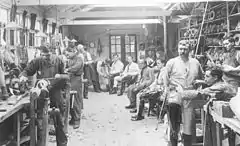
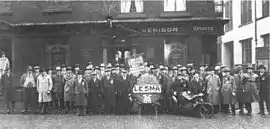
In the immediate aftermath of WW1, limbless men came together for their treatments and fittings, and there developed a spirit of kinship amongst them, arising from their common disabilities and shared experiences. The crutch, the walking stick, the empty sleeve, served as an introduction to friends who had met with similar misfortunes in battle. The spirit of comradeship which had existed in the trenches was kept alive amongst them.
It was during this time that limbless men gathered to discuss their problems and the possibility of some action to improve their conditions.
The first such group was in Glasgow, and in 1921 they created the first branch of the Limbless Ex-Service Men's Association. Soon groups formed in Edinburgh, Dundee, Hamilton and Aberdeen. Officers of the Scottish LESMA established contact with limbless ex-Servicemen in the North of England, and in 1929, branches were formed in Manchester, Leeds, Hull, Burnley, Accrington, Southport, Oldham, Bradford, Halifax and Wigan.
The English branches, however, became dissatisfied with Scottish control and asked for a proper constitution to provide for the democratic election of officers and an executive council. The English branches convened a round table meeting in Leeds in 1931 where it was decided to form the British Limbless Ex-Servicemen's Association, with the first Annual Conference being held in Manchester in 1932.
It was not until the commencement of World War II that branches formed in the South of England but by the end of the war there were 43 groups.
The number of branches reached their peak in the mid-1950s when there were a total of 124. As the number of surviving veterans from World War I declined, so did the number of branches. This trend continued with the passing of the World War II generation, and today 9 branches remain.
Armorial bearings
Blesma was granted armorial bearings in 1958 by the College of Arms. They consist of a shield with a blue ground (representing peace), on which is a sun, for the ‘place in the sun’ the Association seeks to secure for its members. On the sun is a cross potent – an ancient heraldic form associated with the Crusades, particularly with the Crusaders’ Kingdom of Jerusalem. This is composed of four crutch-heads in the colours of the services – blue for the Royal Navy and the Royal Air Force, and red for the Army and the Royal Marines. These are joined together to represent limbless service personnel from the four services united in the Association. The Motto is ‘Service and Fortitude’.
Membership
Eligibility. To be eligible for Membership, a person must have served in any arm of Her Majesty's Armed Forces, regular or reserve and have suffered a life-changing injury – either loss of limb or loss of use of limb, eyesight, hearing or speech. The injury could have been sustained during or after Service, and can be as a direct result of Service or not.
Also eligible are those of civilian status who lose a limb, or the loss of use of a limb, or an eye as a result of War Service or enemy or terrorist action against HM Forces with which those of civilian status are employed, or volunteer, to provide direct support.
Member Proposition
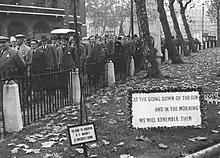
Blesma offers a wide range of support to Members and their families, including:
- Advice on prosthetics and mobility aid provision
- Advice on pensions, benefits and compensation schemes
- Grants
- Activities Programme
- Independent advocacy
- Assistance to the most infirm and elderly
Governance
Blesma is governed by a Board of Trustees consisting of 11 people, including industry experts (5) and Members (6) of the charity. The Board of Trustees is chaired by General Sir Adrian Bradshaw KCB OBE, who took over in June 2017 from Lieutenant General Sir Cedric Delves KBE DSO.
Support
Blesma supports its Members through nine Regional Blesma Support Officers (BSOs) based across the UK, who provide welfare support and advice on a range of issues from benefits to isolation by conducting home visits. The BSOs are supported by Outreach Officers who engage with local communities and Members to keep them connected and to raise the profile of the charity. There is also a Prosthetics Support Officer whose role is specifically to do with assisting Members with their prosthetics or other mobility requirements. The Prosthetics BSO can advocate on behalf of a Member at their limb centre or on the Veterans Prosthetics Panel, for example, and make sure they are getting a good level of support and representation at the required level.
The charity's main office is based in Chelmsford which is where all other staff are based, including the Directors, the Fundraising team, the Activities Team and Membership Services.
Milestones
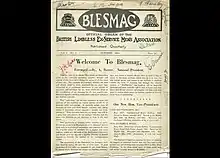
1932 – Blesma formed as a national charity, first annual conference held in Manchester.
1945 – Blesmag started.
1946 – Blesma Advisory Council formed.
1947 – Charles Dunham appointed Employment and Welfare Officer.
1948 – Blesma National Appeal Committee formed. Duchess of Gloucester becomes Patron of Blesma.
1949 – Cyril Stephens appointed National President in succession to Arthur Baxter. Blesma Headquarters Welfare Committee formed. Official opening of the Blackpool Home.
1951 – Blesma All-Party Committee of MPs formed.
1954 – Opening of Blesma Portsmouth Home.
1958 – Transfer of Blesma HQ from Manchester to Cannon Street, London. Charles Dunham appointed National General Secretary. Grant of Armorial Bearings to Blesma.
1959 – Number of First World War limbless drops below 20,000.
1963 – Opening of Blesma Crieff Home. Blesma joins World Veterans Foundation.
1965 – Blesma HQ moved to Chadwell Heath, Essex.
1966 – Amputees Advisory Service for hospital visiting introduced by Blesma. Recommendations of McCorquodale Committee accepted.
1970 – Funds raised by Blesma National Appeal Committee passes £1million mark.
1975 – Philip Dixon appointed National chairman in succession to Ernie Law. Portsmouth Home closed. First World War limbless drops below 4,000.
1976 – Members ascend Mount Snowdon with Prince Charles.
1977 – Blesma welfare grants annually exceed £50,000.
1978 – Blesma film ‘So Much To Offer’ released, with commentary by Kenneth More. Blesma float joins the Lord Mayors Show in central London.
1979 – Hrubec/Ryder report on amputations and cardio-vascular disorder published and accepted by the Government.
1980 – Mr Ted Lawrence takes over as National Welfare Officer.
1981 – Mr Brian Fox takes over as National General Secretary. Limbless ex-servicemen down to about 10,000. Himalayan peak of Nun Kun (23,410 ft) climbed by Ealing Member, Norman Croucher.
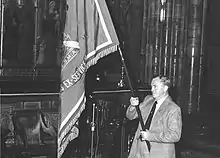
1982 – Blesma Golden Jubilee
1983 – Sir Austin ‘Tiny’ Bunch CBE takes over as National President
1989 – Ray Holland takes over as National General Secretary
1992 – Duke of Westminster takes over as National President
2000 – Jerome Church OBE takes over as National General Secretary
2013 – General Secretary role changes to Chief Executive. New Magazine
2014 – Barry Le Grys MBE takes over as Chief Executive. Renaming of charity from BLESMA (British Limbless Ex-Servicemen's Association) to Blesma, The Limbless Veterans. The inaugural Invictus Games in London featured more than 400 competitors, both serving personnel and veterans, from 13 nations, including 46 Blesma Members.
2015 – The White Report commissioned by Blesma and written by triple amputee Member Jon White, was the most detailed study of how the nation's 160 most complex war wounded men and women are treated.[1] It found failings across the NHS and called for a fresh approach to their care, resulting in a number of improvements made by the NHS.
2016 – Those who lose the use of their limb(s) through a traumatic incident that is not service related are now eligible for the charity's support. Blesma's Blackpool home closed with the 12 remaining residents moved to different nursing homes across the North West.
Patrons
1948–2004 Princess Alice, Duchess of Gloucester
2006–present Prince Richard, Duke of Gloucester
National presidents
1932–1938 Sam Doubleday
1938–1949 Arthur Baxter OBE
1949–1956 Cyril Stephens OBE
1956–1983 Earl of Ancaster KCVO
1983–1992 Sir Austin ‘Tiny’ Bunch CBE
National General Secretaries
1934–1937 J V Bell
1937–1958 George Chandley OBE MM
1958–1980 Charles Dunham MBE
1981–1989 Brian Fox
1989–2000 Ray Holland
2000–2014 Jerome Church OBE
Title changed to Chief Executive from 2013
2014–2019 Barry Le Grys MBE
2020–present Jon Bryant OBE
See also
- Leonard Cheshire Disability, supports independent living for disabled people